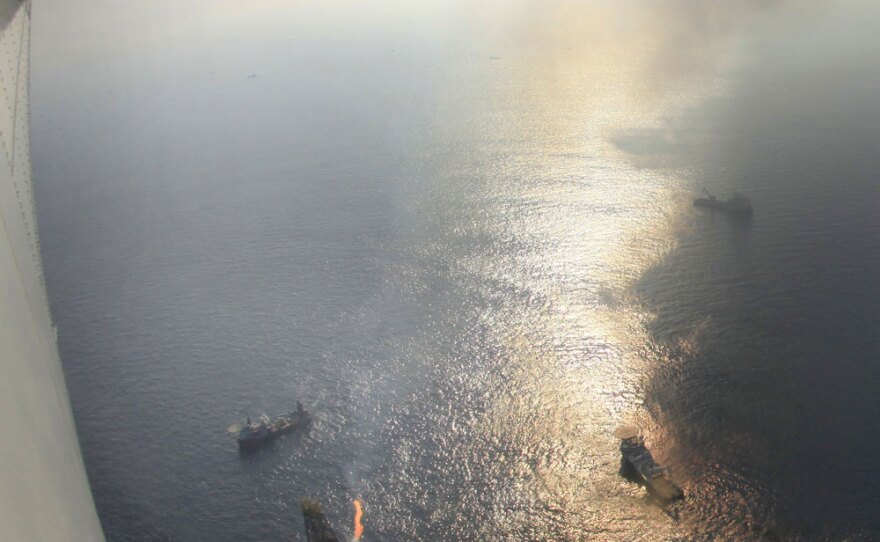The oil spill in the Gulf of Mexico has thrust the Coast Guard, normally a bit player in the federal government, into a lead role. It must coordinate the response to the spill, working with BP on one side, and countless state and local officials and commercial interests on the other. This a huge job for an agency many say is already spread too thin.
Two months before the spill, in February, the Obama administration proposed cutting the Coast Guard's budget in fiscal year 2011. That prompted protests from members of Congress of both parties, who urged a budget increase for the agency.
Coast Guard Adm. Thad Allen, as the national incident commander, is the face of the government's spill response. Allen has officially stepped down as Coast Guard commandant, but his retirement has been indefinitely postponed because of the Gulf spill. His current duties require coordinating, listening, cajoling and patience. Needless to say, it's a challenge.
"You have a lot of federal agencies out there -- all of which have legitimate roles, missions and mandates operating in the same battle space, if you will, and the question is how do you bring all those together," Allen says.
The Coast Guard has more than 1,000 personnel in the Gulf, along with dozens of boats and ships (the exact number is classified). They do everything from conducting hearings on the spill to flying journalists over it.
They've occasionally tangled with some of those journalists over access to oil-damaged marshes and beaches, an example of the service's muddled line of authority.
Taking On Oil: Competing Roles
The Coast Guard is responsible for coordinating a lot, but it is directly in charge of relatively little.
After the 1989 Exxon Valdez spill, Congress and the Environmental Protection Agency decided that the party responsible for a spill, in this case BP, would work alongside the Coast Guard to clean up the oil. Allen admits the unprecedented size and scope of the Gulf spill exposed the plan's weaknesses.
"Undoubtedly, the traditional national contingency plan model that was created in 1990 doesn't quite fit on this response," Allen says.
There are questions, too, about the Coast Guard's role before the blowout, since the agency is in charge of inspecting the drill rigs.

Here again, the Coast Guard shares responsibility, this time with the Minerals Management Service -- the infamous MMS. That agency is responsible for the drilling part of the rigs, and the Coast Guard judges the rigs' seaworthiness.
"Largely these platforms are self-regulated by the companies who own and manage them, and Coast Guard is doing an element of spot checking," says former Coast Guard Cmdr. Steven Flynn, now president of the Center for National Policy.
The Coast Guard has admitted that, in the words of one officer, the pace of the technology has outrun the current regulations.
A bigger problem than keeping up with technology may be integrating the Coast Guard's responsibility for oil with all of its other jobs. David Helvarg, author of a book about the Coast Guard called Rescue Warriors, calls the folks who work for the agency America's "forgotten heroes."
"They're really this multimission maritime agency that has responsibility for everything from drugs and migration law enforcement to safety, search and rescue and response, and oil spill response," Helvarg says.
There are some 40,000 enlisted personnel in the Coast Guard -- far fewer than the service needs, according to Helvarg.
"We really need to double their size this decade and double it again by 2030 so they're closer in size to the Marine Corps than the New York police," Helvarg says.
A Changing Mission
The Coast Guard, which had been part of the Transportation Department, was integrated into the newly formed Department of Homeland Security after Sept. 11. The Coast Guard's maritime safety functions soon were eclipsed by its role in providing port security and capturing drug runners.
Defense analyst Robbin Laird says spending on the Coast Guard needs to be increased if the service is to succeed in its many missions.
"Otherwise what happens is that you squeeze them every year, and it puts them in the position of, 'Well, am I doing safety or security, or am I doing oil prevention?' We don't want to be, as a nation, in that situation. We want this to be properly funded. If we're going to do this, we want it properly funded," Laird says.
The Coast Guard is proud of its ability to carry out its varied responsibilities. But Allen says the service's unofficial mantra of "doing more with less" is more complicated in practice.
"It's a balance, but I would tell you right now we could use more."
Copyright 2022 NPR. To see more, visit https://www.npr.org. 9(MDAzMjM2NDYzMDEyMzc1Njk5NjAxNzY3OQ001))







